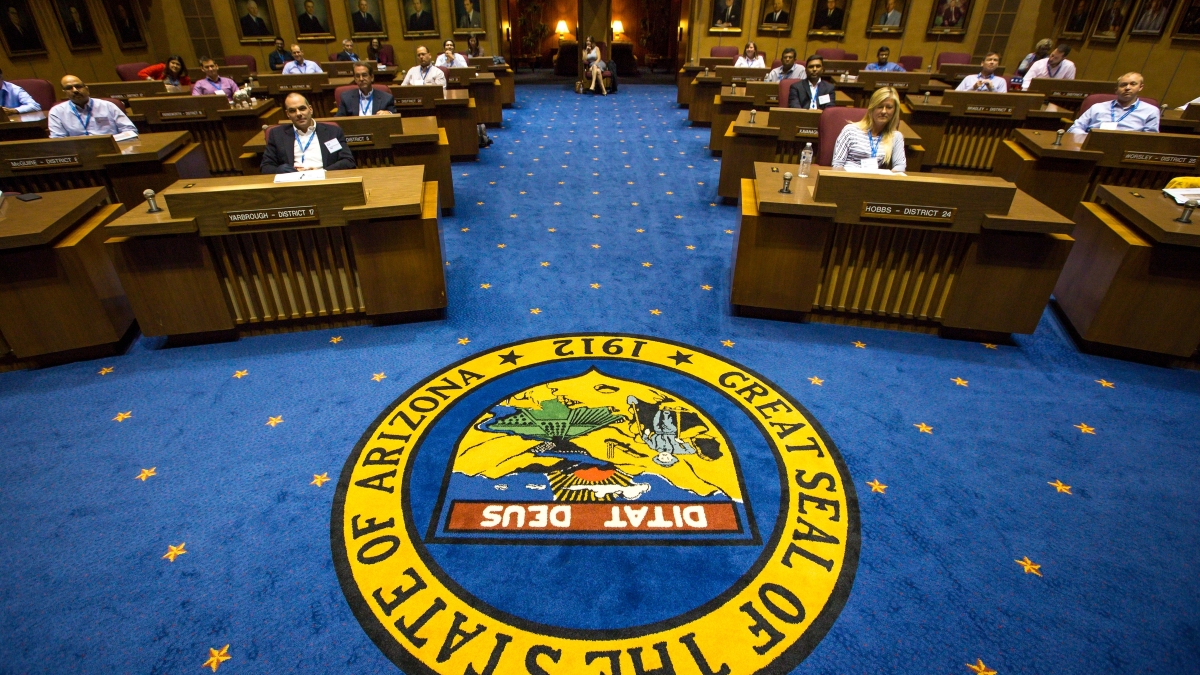After a day of wheedling, needling and dramatic speeches, a class of Arizona State University students learned how hard it is to navigate the political process and get what you want.
“Nonsense, foolery and ridiculousness,” declared Tres Wooldridge, one of the 29 students in the Executive Master of Business Administration class in the W. P. Carey School of Business who participated in the simulated “Capitol Budget Game” on Thursday.
Like all the students, Wooldridge was playing a role for the legislative simulation at the Arizona Senate building in Phoenix. He was the Senate minority leader in the model. Others played the governor, legislative leaders such as the Senate president, and lawmakers representing a variety of districts.
“The bipartisan nonsense going on here is suspect,” Wooldridge said as the “legislators” negotiated a balanced budget.
The students, all managers with several years’ experience — the average age of the class is 40 — are in a required course called “Business Strategy and Public Policy.” Later this month, they will spend a week in Washington, D.C., to learn about policy-making at the federal level.
The point is to demystify the process so the future business leaders can use it to their advantage, according to Gerry Keim, the management professor at the W. P. Carey School of Business who runs the program.
“We teach them how to analyze public policy and how to move through the process,” Keim said. “Just like most Americans, we’ve gotten too busy with our lives and our careers to pay much attention to the political process, and we’re not very efficient at representing our interests or making sure that our voices get heard.”
The students learn that changes such as new taxes or reporting regulations can affect a business just as much as a rival’s new product, and how they can influence those decisions through lobbying.
The “politicians” started the day with a slate of programs to either pay for or defund, and worked with real-life scenarios, such as a horrific toxic spill that creates a domino effect in funding biotechnology and education. They also faced pressure to be re-elected and whether to vote to maintain party principles or to provide practical relief for constituents. Along the way, points were earned or lost.
Although the game condenses the typically months-long budget process into a day, there were many realistic aspects. Cox Communications provided its actual lobbyists to work with the student-legislators just as they would in a real session. Cox staffers also pretended to be journalists, asking questions and producing “newspapers” throughout the day, complete with quotes taken out of context.
As the “budget” came together, the students went to the Senate floor and voted with the actual system used by Arizona’s senators. Their final $255 million budget defunded abortion subsidies and kept money for job training.
Sam George (left), with Intel, explains the budget-scoring process to Tanay Karmakar, with American Express (right), while "gamemaster" Taylor Young (center) watches on the floor of the State Senate on July 14. The exercise, called the Capitol Budget Game, is for ASU executive MBA students. It was was created by ASU alumnus Young, who is an attorney. Photo by Charlie Leight/ASU Now
The “Capitol Budget Game” was invented by Taylor Young, a Phoenix attorney and graduate of the ASU Sandra Day O’Connor College of Law who also served as the “game master” for the day.
He asked the students to reflect at the end of the day.
“When we sit from afar and look at our representatives, we often ascribe motives to them they don’t really have. They’re usually very responsive to their constituents,” Young said.
Genevieve Vega, who is a sales trainer at Avnet, played the majority whip for the day. She is involved in politics and has been a precinct committee member and a delegate to the Democratic National Convention. Vega hopes her classmates also will become more engaged.
“What was great about today’s exercise was the experiential learning,” she said. “For some of my classmates, it’s eye-opening. The stuff that happens in the Legislature are real things that affect all of our families and our businesses.”
Genevieve Vega, with Avnet, explains budget scoring to Varn Chavez, with Cable One, on the floor of the State Senate on July 14. Vega hopes her classmates also will become more engaged in the political process after the budget exercise. Photo by Charlie Leight/ASU Now
Woodridge said the experience has made him think about how he’ll apply the lessons to his business.
“It’s given me a lot of insight into what it takes to get legislation passed. I’m somewhat disappointed in the process but enlightened also,” he said.
“The entire class is about how you can use political advocacy to improve your company’s position, so I’m thinking about what I should be doing in my community and what contacts I should be making at the corporate level.”
Top photo: Members of an ASU executive MBA class wait for final copies of the budget, on the floor of the State Senate on July 14, after working with lobbyists in subcommittees. Photo by Charlie Leight/ASU Now
More Law, journalism and politics

ASU experts share insights on gender equality across the globe
International Women’s Day has its roots in the American labor movement. In 1908, 15,000 women in New York City marched to protest against dangerous working conditions, better pay and the right to…

ASU Law to offer its JD part time and online, addressing critical legal shortages and public service
The Sandra Day O’Connor College of Law at Arizona State University, ranked 15th among the nation’s top public law schools, announced today a new part-time and fully online option for its juris doctor…

ASU launches nonpartisan Institute of Politics to inspire future public service leaders
Former Republican presidential nominee and Arizona native Barry Goldwater once wrote, "We have forgotten that a society progresses only to the extent that it produces leaders that are capable of…


